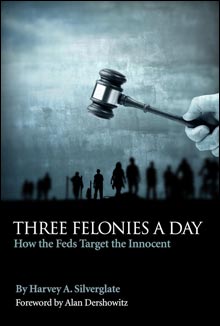Why is this so?
Because since the mid 1980s federal sentences have been ratcheted up by unreasonable and unconscionable factors. Crimes that might have been punishable by up to a year or two previously now can get you 20 years, 25 years. The federal government recommends these enormous sentences, and judges, playing the lackey, I'm ashamed to say, often impose these sentences.
Now, all a judge has to do is impose a 25-year sentence on a confessed or convicted criminal, and suddenly thousands of people under investigation take deals offered by prosecutors and recommended by their own lawyers, to plead guilty to a lesser offense with a recommendation for a lesser sentence. Then they testify against others in their companies or in their circles. That way you get this self-perpetuating cycle, where the government has an endless supply of witnesses and — as Alan Dershowitz puts it in his classic formulation — "The government teaches these witnesses not only how to sing, but how to compose." Witnesses faced with brutal sentences don't necessarily tell the truth. They tell prosecutors what they want to hear.
In other words, the safeguard of trial by jury is negated in a nasty way by what is, in effect, justice by bureaucracy, justice by coercion.
Correct.
If that's the case, then the federal government is sponsoring its own brand of white-collar extortion.
Yes. Typical prosecutorial conduct often compromises the quality of justice and threatens the constitutional rights of us all: on the right, the left, and in the center.
Authoritarianism disguised as due process?
That [chuckling] is a rather tepid way to put it.

Three Felonies a Day: How Feds Target the Innocent | By Harvey Silverglate | Encounter Books | 323 pages | $25.95
|
You began your career as a crusading, left-wing lawyer. Why do you evince such sympathy for Arthur Andersen, the big accounting firm?
I was considered, and am still considered by those who know me and follow my work closely, as a liberal of the left. I haven't changed my politics. Whether for better or worse, I'm pretty much the same person I was back when I started in 1967.Liberalism has changed a lot. When I was a young liberal, the left was very reliably in favor of free speech and due process. Now, you get a lot of people on the left who suddenly are prepared to endorse censorship in the name of avoiding harassment for what they call historically disadvantaged groups. You have groups on the left who are prepared to waive due process if it means getting the people that they really want, like CIA interrogators and torturers. I don't believe in cutting down all the trees in the legal forest just to find the devil hiding behind one of them. I am a firm believer that if we do that for anybody, then all of us are endangered, becauseyou set a precedent every time you pursue somebody, and that precedent can very easily turn around and whack us.